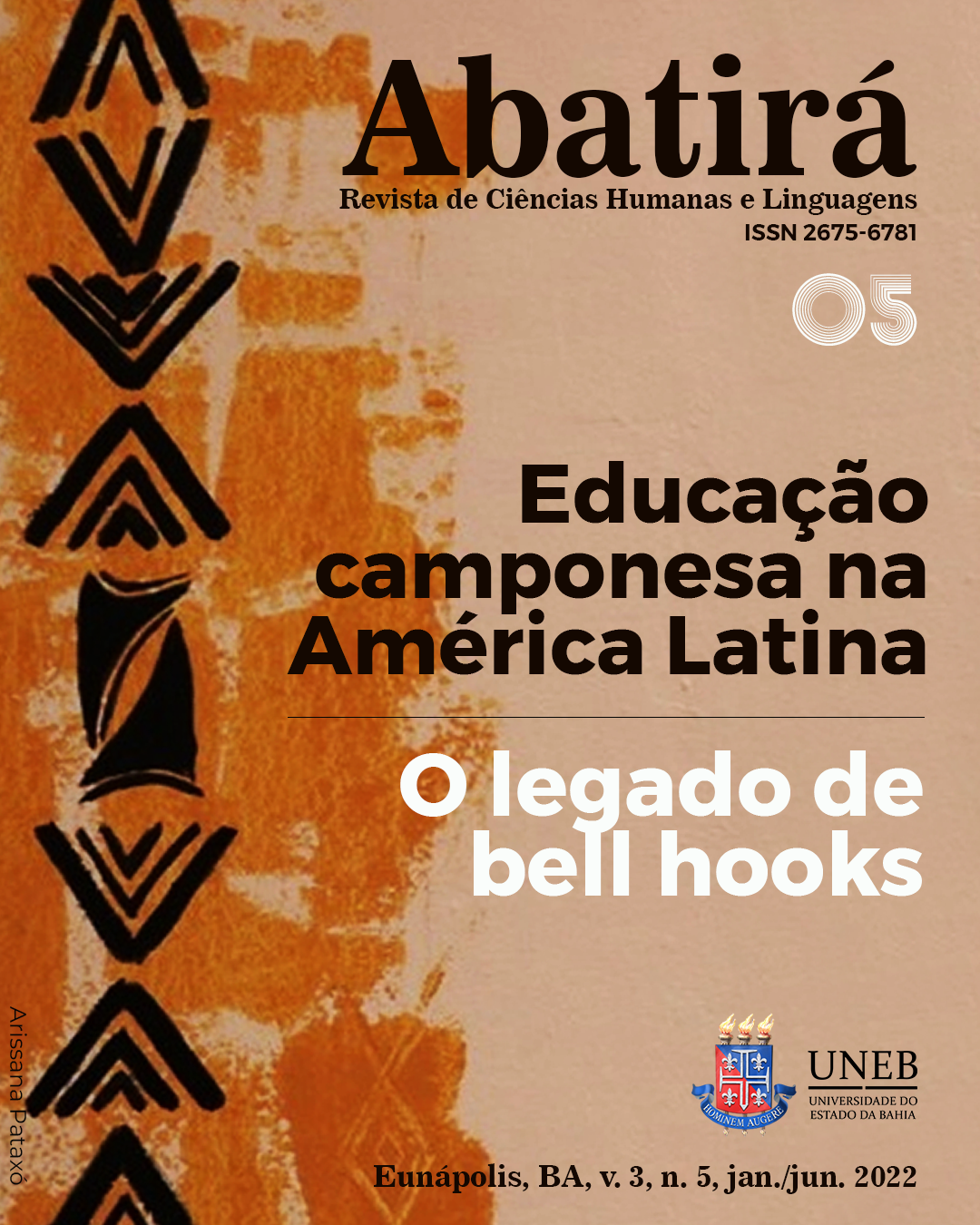(Re)Thinking the Teaching-Learning Process in Rural Schools
From pedagogical practices that contribute to environmental education
Keywords:
Environmental Education, Organic Vegetables, Pedagogical practicesAbstract
This article is the result of the unfolding of the research project for the conclusion of the Pedagogy course carried out in a multigrade class of Elementary School I, at Escola Municipal João Rocha da Silva (EMJRS), with the objective of understanding how the production of organic vegetables can contribute to the development of pedagogical practices that include environmental and family education. In dialogue with students and teachers of this school, it was possible to perceive the need to work with this theme, first, as a way to redirect the garbage produced in the school; second, as a contribution to pedagogical practices that can be undertaken from the production of vegetables and meet possible needs of students within the school itself. Thus, in order to carry out the research, a previous survey was necessary, with a structured questionnaire to understand how the teacher understood the importance of pedagogical practices aimed at environmental and family education in rural schools, using these elements in an interdisciplinary way for the EMJRS. When thinking about this research as a possible pedagogical strategy for innovations in rural education, capable of transforming subjects and their realities, we had as theoretical support the productions of (CAJAIBA, 2013); (ARROYO, 2011), (CALDART and MOLINA, 2011); (RIOS, 2014). Because I understand the need to “collect data from people”, I chose field research (FONSECA, 2002), with an exploratory qualitative-quantitative approach, because we understand that this type of research provides greater familiarity with the investigated problem (MINAYO,1996). We used as instruments and research techniques data collection, structured interview (closed questionnaire), observation of the variables of the object under study.
Downloads
References
ARROYO, Miguel Gonzalez. Diversidade. In: CALDART, R.; PEREIRA, I. B.; ALENTEJANO, P; FRIGOTTO, G. (Orgs). Dicionário da Educação do Campo. Rio de Janeiro, São Paulo: Escola Politécnica de Saúde Joaquim Venâncio, Expressão Popular, 2012.
ARROYO, Miguel G. Outros Sujeitos, Outras Pedagogias. 2. Ed. – Petrópolis, RJ: Vozes, 2014.
ARROYO, Miguel G., Roseli Salete Caldart e Mônica C. Molina. Por uma Educação do Campo. Belo Horizonte/Porto Alegre/Brasília, outono de 2004.
AMARAL, A. Queiroz; JUNIOR, Élio Jacob H.; SADRAQUE, Caetano; MIGUEL, Kassiana; LARA, Juliete Gomes. Seminário Internacional. Disponível em: <http://eventos.uepg.br/seminariointernacional/agenda21parana/trabalho_cientifico/TrabalhoCientifico001.pdf>. Acesso em 29 Jan. 2016.
BOOG, Maria Cristina Faber. Atuação do nutricionista em saúde pública na promoção da alimentação saudável. Disponível em: <http://educacaoemnutricao.com.br/documentos/atuacaodonutricionistaemsaudepublicanapromocaodaalimentacaosaudavel55694.pdf>. Acesso em: 05 Mar. 2016.
CAJAIBA, Reinaldo Lucas. Horta orgânica escolar como contributo para desenvolvimento da educação ambiental em uma escola pública rural no município de Uruará, Pa. Disponível em:<http://www.ibeas.org.br/congresso/Trabalhos2013/VII-041.pdf>. Acesso em: 29. Jan. 2016.
CAPORAL, F. R.; COSTABEBER, J. A. Agroecologia e Desenvolvimento Rural Sustentável: perspectivas para uma nova Extensão Rural. In: Etges,Virgínia Elisabeta (Orgs.). Desenvolvimento rural: potencialidades em questão. Santa Cruz do Sul: EDUSC, 2001; p.19-52.
Constituição Federal de 1988. Disponível em:<http://www.planalto.gov.br/ccivil_03/constituicao/ConstituicaoCompilado.htm>. Acesso em: 29 Jan. 2016.
Decreto 7352/10 | Decreto nº 7.352, de 4 de novembro de 2010. Política de educação do campo e o Programa Nacional de Educação na Reforma Agrária – PRONERA. Disponível em:<http://presrepublica.jusbrasil.com.br/legislacao/1025597/decreto-7352-10>. Acesso em: 03 Mar. 2016.
ESTUDO DE CASO: Organização Socioprodutiva de Lideranças Jovens em Áreas Rurais e Estuarinas do Território do Baixo Sul da Bahia. Disponível em:<http://www.ibam.org.br/media/arquivos/estudos/estudo_terragua.pdf
http://www.mpabrasil.org.br/biblioteca/textos-artigos/agricultura-camponesa-e-o-estado-brasileiro>. Acesso em: 11 Jan. 2016.
FONSECA, J. J. S. Metodologia da pesquisa científica. Fortaleza: UEC, 2002. Apostila.
FREIRE, Paulo. Pedagogia da Autonomia: Saberes necessários à prática educativa/Paulo Freire. – São Paulo: Paz e Terra, 1996. – (Coleção Leitura).
GHEDIN, Evandro. (Org). Educação do Campo: Epistemologias e Práticas. – 1. Ed. São Paulo: Cortez, 2012.
IRALA, Clarissa Hoffman; FERNANDEZ, Patrícia Martins. Manual para escola. A Escola promovendo hábitos alimentares saudáveis. Disponível em: <http://bvsms.saude.gov.br/bvs/publicacoes/horta.pdf>. Acesso em: 29 Jan. 2016.
LEI Nº 9.394, DE 20 DE DEZEMBRO DE 1996.Disponível em:<http://www.planalto.gov.br/ccivil_03/leis/L9394.htm>. Acesso em: 20 Jan. 2016.
Manual. Horta orgânica domestica. Disponível em:<https://permacoletivo.files.wordpress.com/2008/06/manual-horta-organica-domestica.pdf>. Acesso em: 29 Jan. 2016.
MARCOCCIA, P. C. Paula; FONTANA; M. Iolanda; SOUZA, M. Antônia; PIANOVSKI, Regina Bonat. Políticas Públicas Da Educação Do Campo: Desafios À Formação Continuada de Professores. Disponível em:<http://www.anpae.org.br/iberoamericano2012/Trabalhos/PatriciaCorreiadePaulaMarcoccia_res_int_GT1.pdf>. Acesso em: 16 Mar. 2016.
MINAYO, Maria C.S. (org.). Ciência, Técnica e a Arte: O Desafio da Pesquisa Social. In: MINAYO, Maria C.S. PESQUISA SOCIAL, Teoria, Método e Criatividade. Petrópolis, Vozes. 14 Ed. 1996. Cap 1.
MORGADO, F. Silva; AGUIAR, M. Aparecida. A horta Escolar na Educação Ambiental e Alimentar. Disponível em: <https://periodicos.ufsc.br/index.php/extensio/article/view/9531/8950>. Acesso em: 29 Jan. 2016.
RIOS, Roseane Oliveira. Contradições da Educação do Campo no Baixo Sul da Bahia. Disponível em: <http://www.cbg2014.agb.org.br/resources/anais/1/1404663293_ARQUIVO_artigo-ED.pdf>. Acesso em: 24 Jan. 2016.
ROCHA, Maria; MARTINS, Maria; MARTINS, Aracy. Territórios Educativos na Educação do Campo. (Orgs.). Belorizonte: Autêntica, 2012.
SAVIANI, Demerval. Escola e democracia. Campinas: Autores Associados. 38 ed. 2006.
SIMAS, Luiz Antonio; RUFINO, Luiz. Flecha no Tempo. Rio de Janeiro: Ed. Mórula, 2019.
THIOLLENT, Michel. Metodologia da pesquisa-ação. 2. ed. São Paulo: Cortez, 1986.
Downloads
Published
How to Cite
Issue
Section
License

Este trabalho está licenciado sob uma licença Creative Commons Attribution 4.0 International License.Você é livre para:
Compartilhar - copia e redistribui o material em qualquer meio ou formato; Adapte - remixe, transforme e construa a partir do material para qualquer propósito, mesmo comercialmente. Esta licença é aceitável para Obras Culturais Livres. O licenciante não pode revogar essas liberdades, desde que você siga os termos da licença.
Sob os seguintes termos:
Atribuição - você deve dar o crédito apropriado, fornecer um link para a licença e indicar se alguma alteração foi feita. Você pode fazer isso de qualquer maneira razoável, mas não de uma forma que sugira que você ou seu uso seja aprovado pelo licenciante.
Não há restrições adicionais - Você não pode aplicar termos legais ou medidas tecnológicas que restrinjam legalmente outros para fazer qualquer uso permitido pela licença.





